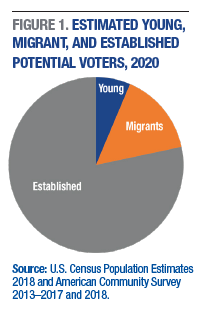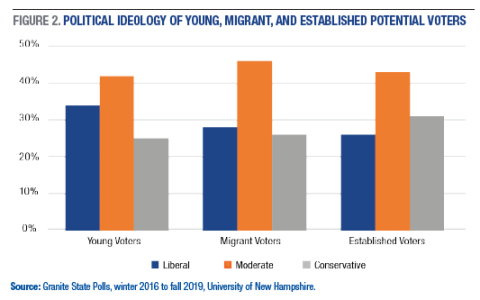download the brief
Key Findings

More than 20 percent of potential primary voters this year were either not old enough to vote in 2016 or resided somewhere other than New Hampshire.

Record Democratic turnout, eclipsing the 2008 mark, is quite plausible in 2020.
The New Hampshire primary often defies prognosticators, but one outcome already is certain: Many voters will participate in this event for the first time. More than 20 percent of potential primary voters this year were either not old enough to vote in 2016 or resided somewhere other than New Hampshire (Figure 1).

New Hampshire’s population is among the most mobile in the nation: two-thirds of residents age 25 and older were not born in the state. Such migration, coupled with natural population change as young voters come of age and older generations of voters pass from the scene, has produced considerable turnover in the voting population. These younger voters and recent migrants may change the outcome of the primary. Both groups tend to be more liberal than voting-age residents who have lived here longer (Figure 2).
Another source of volatility is the state’s large pool of “undeclared” voters. Many of them are likely to ask for Democratic ballots, given the relatively uncompetitive Republican primary. In addition, the very large field of Democratic candidates, plus overall Democratic voter enthusiasm, will likely boost participation. Record Democratic turnout, eclipsing the 2008 mark, is quite plausible.

Kenneth M. Johnson is senior demographer at the Carsey School of Public Policy, Class of 1940 professor of sociology at the University of New Hampshire, and an Andrew Carnegie fellow. Dante J. Scala is professor of political science at the University of New Hampshire and a fellow at the Carsey School of Public Policy. Andrew Smith directs the Survey Center at the University of New Hampshire and is a professor of practice in political science at the University of New Hampshire.